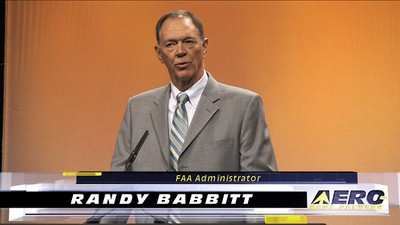Supplemental NPRM Responds To A Congressional Mandate
The FAA has proposed a substantial and wide-ranging overhaul of
air carrier crew training. The supplemental Notice of Proposed
Rulemaking (SNPRM) addresses comments from the January 2009
proposal and provisions laid out in the Airline Safety and Federal
Aviation Administration Extension Act of 2010.

"The United States has the world's safest aviation system, but
we are continually seeking ways to make it even safer," said U.S.
Transportation Secretary Ray LaHood. "This proposal will make U.S.
pilots and other crewmembers even better-equipped to handle any
emergency they may encounter."
"The FAA is proposing the most significant changes to air
carrier training in 20 years," said FAA Administrator Randy
Babbitt. "This is a major effort to strengthen the performance of
pilots, flight attendants and dispatchers through better
training."
Responding to a congressional mandate, the proposed requirements
reflect a significant shift in training philosophy designed to
produce qualified and capable crewmembers and dispatchers ready to
face current and future aviation challenges.
Under this proposal, flight crews would have to demonstrate, not
just learn, critical skills in "real-world" training scenarios.
Pilots would be required to train as a complete flight crew,
coordinate their actions through Crew Resource Management, and fly
scenarios based on actual events. Dispatchers would have enhanced
training and would be required to apply that knowledge in today's
complex operating environment. The revised proposal would require
ground and flight training to teach pilots how to recognize and
recover from stalls and aircraft upsets. The proposal also would
require remedial training for pilots with performance deficiencies
such as failing a proficiency test or check, or unsatisfactory
performance during flight training or a simulator course.
The proposal would address how air carriers may modify training
programs for aircraft with similar flight handling characteristics.
It also reorganizes and revises the qualification, training, and
evaluation requirements for all crewmembers and dispatchers. Like
the original proposal, the supplemental notice would require the
use of pilot flight simulation training devices. Pilots also would
have to complete special hazard training in addition to practicing
the use of crew resource management skills.

The supplemental proposal also contains requirements derived
from voluntary FAA-approved alternative training regimens such as
Advanced Qualification Programs (AQP). These include:
- Crew-oriented, scenario-based training.
- Demonstration of satisfactory skill on each task to determine
necessary job performance training hours.
- a continuous analysis process that lets the certificate holder
validate how effective the qualification and training program is,
or where it may need to be changed.
The new proposal also clarifies that the proposal's economic
impact on air carriers that conduct training under voluntary,
FAA-approved alternative programs, such as AQP, and the time used
for flight simulator training, would be minimal. Flight attendants
would be required to complete hands-on emergency drills every 12
months, and the proposal would standardize the training and
experience requirements for certain dispatchers and
instructors.
The proposal will be on display at the
Federal Register, and the comment period
closes on July 19, 2011.
 ANN's Daily Aero-Term (04.24.24): Runway Lead-in Light System
ANN's Daily Aero-Term (04.24.24): Runway Lead-in Light System ANN's Daily Aero-Linx (04.24.24)
ANN's Daily Aero-Linx (04.24.24) Aero-FAQ: Dave Juwel's Aviation Marketing Stories -- ITBOA BNITBOB
Aero-FAQ: Dave Juwel's Aviation Marketing Stories -- ITBOA BNITBOB Classic Aero-TV: Best Seat in The House -- 'Inside' The AeroShell Aerobatic Team
Classic Aero-TV: Best Seat in The House -- 'Inside' The AeroShell Aerobatic Team Airborne Affordable Flyers 04.18.24: CarbonCub UL, Fisher, Affordable Flyer Expo
Airborne Affordable Flyers 04.18.24: CarbonCub UL, Fisher, Affordable Flyer Expo




